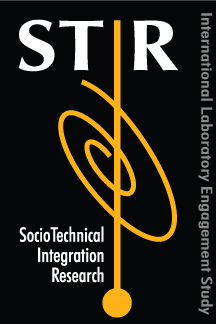Vision & Purpose
Communities of Integration Workshop
Tempe Mission Palms Hotel
Arizona State University, Tempe, AZ
May 21-22, 2013
While a great deal of interdisciplinary research has been done in the past decades, this workshop serves to focus new attention on projects that seek to facilitate and understand productive collaborations between technical experts and societal researchers. Many of these projects can be seen through the lens of “sociotechnical integration” or STI, an emerging field of research that is both narrower and broader than interdisciplinarity more generally. By focusing on efforts that specifically seek integration of the social and technical (be it conceived of as “arts & science,” “hard & soft,” or “social sciences & humanities”), its interests are more narrow than the study of interdisciplinarity. Yet, STI is also broader than many historic studies of interdisciplinarity, as it foregrounds the importance of not only the disciplinary integration, but also the social, human, policy, and political dimensions of doing so and the practicalities of implementing this work in the real world.
At the Communities of Integration Workshop, we seek to understand the state of Sociotechnical Integration as an emerging field. We will bring together multiple major projects and communities of practice that work towards some form of STI – including (but not limited to) the approaches of the Studies of Expertise & Experience, the Toolbox project, Socio-Technical Integration Research (STIR), and Trading Zones & Conation. These communities will have the opportunity to first meet as smaller groups to assess the state of their research, share ongoing work, and consider their projects as STI. Subsequently all four communities, as well as other attendees, will be brought together for workshop and whole group sessions to try and better understand differing approaches to STI.
During this synthesis we are interested in three main questions – form, means, and ends – that will reveal important differences in each approach to STI. Form focuses on the ‘what’ of each approach to STI – differing focuses, fundamental questions, and frameworks for understanding interactions. Means consists of ways of both studying and facilitating STI, including how opportunities and challenges are identified, how these projects of integration are navigated, and how communication and relationship building occurs. Ends seeks to identify the ‘why’ of STI, including the value of STI, STI’s role in broader society, and approach-specific motivations.




